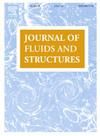Development of Reduced-Order-Discrete-Module method for hydroelastic analysis of floating flexible structures
IF 3.4
2区 工程技术
Q1 ENGINEERING, MECHANICAL
引用次数: 0
Abstract
The present study proposes a novel method for analyzing the hydroelastic response of floating flexible structures based on Reduced-Order-Discrete-Module (RODM) model. In this model, the floating flexible structure is discretized into a finite number of modules. The hydrodynamic problem is simplified as the interaction between waves and multiple modules. The hydroelastic response is approximated by solving the motion equation of the multibody system, in which the mass and stiffness of the structure are obtained from the reduced-order matrices by the finite element method with a system equivalent reduction expansion process. By using the transformation matrix, the detailed floating structure response can be reconstructed from the multibody dynamics. The validity of the proposed method was demonstrated by comparing the results with the experimental data and other existing methods. The results show that this study has developed an accurate hydroelastic model to analyze the hydroelastic response of floating flexible structures. A module number selection formula is proposed to select the appropriate number of modules based on the exciting force frequency. This model is relatively easy to implement for the hydroelastic problem of interconnection modules and take into account the spatial inhomogeneity of wind/wave field. The proposed model can offer a useful tool for analyzing the hydroelastic response of the offshore floating photovoltaic systems.
开发用于浮动柔性结构水弹性分析的减阶离散模块法
本研究提出了一种基于降序离散模块(RODM)模型分析浮动柔性结构水弹性响应的新方法。在该模型中,浮动柔性结构被离散为有限数量的模块。水动力问题被简化为波浪与多个模块之间的相互作用。水弹性响应是通过求解多体系统的运动方程近似得到的,其中结构的质量和刚度是通过有限元法的系统等效缩减扩展过程从缩减阶矩阵中得到的。通过使用变换矩阵,可以从多体动力学中重建详细的浮动结构响应。通过将结果与实验数据和其他现有方法进行比较,证明了所提方法的有效性。结果表明,本研究建立了一个精确的水弹性模型来分析浮动柔性结构的水弹性响应。提出了模块数量选择公式,可根据激振力频率选择合适的模块数量。该模型对于互联模块的水弹性问题相对容易实现,并考虑了风场/波场的空间不均匀性。所提出的模型可为分析海上浮动光伏系统的水弹性响应提供有用的工具。
本文章由计算机程序翻译,如有差异,请以英文原文为准。
求助全文
约1分钟内获得全文
求助全文
来源期刊

Journal of Fluids and Structures
工程技术-工程:机械
CiteScore
6.90
自引率
8.30%
发文量
173
审稿时长
65 days
期刊介绍:
The Journal of Fluids and Structures serves as a focal point and a forum for the exchange of ideas, for the many kinds of specialists and practitioners concerned with fluid–structure interactions and the dynamics of systems related thereto, in any field. One of its aims is to foster the cross–fertilization of ideas, methods and techniques in the various disciplines involved.
The journal publishes papers that present original and significant contributions on all aspects of the mechanical interactions between fluids and solids, regardless of scale.
 求助内容:
求助内容: 应助结果提醒方式:
应助结果提醒方式:


